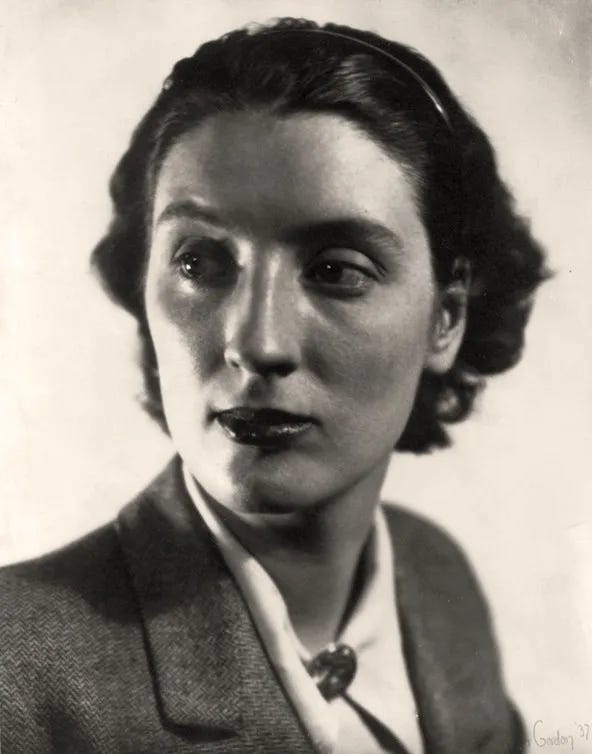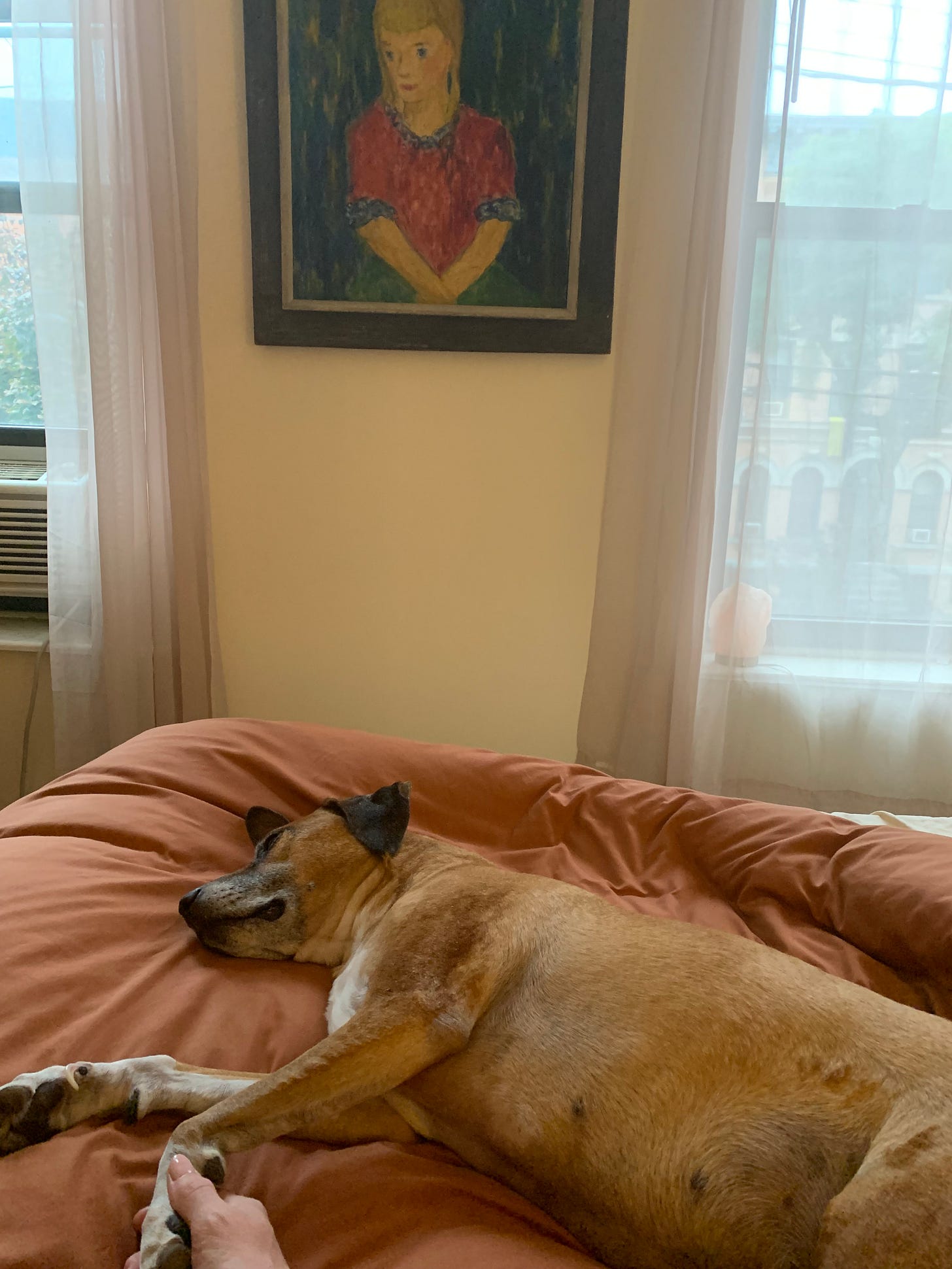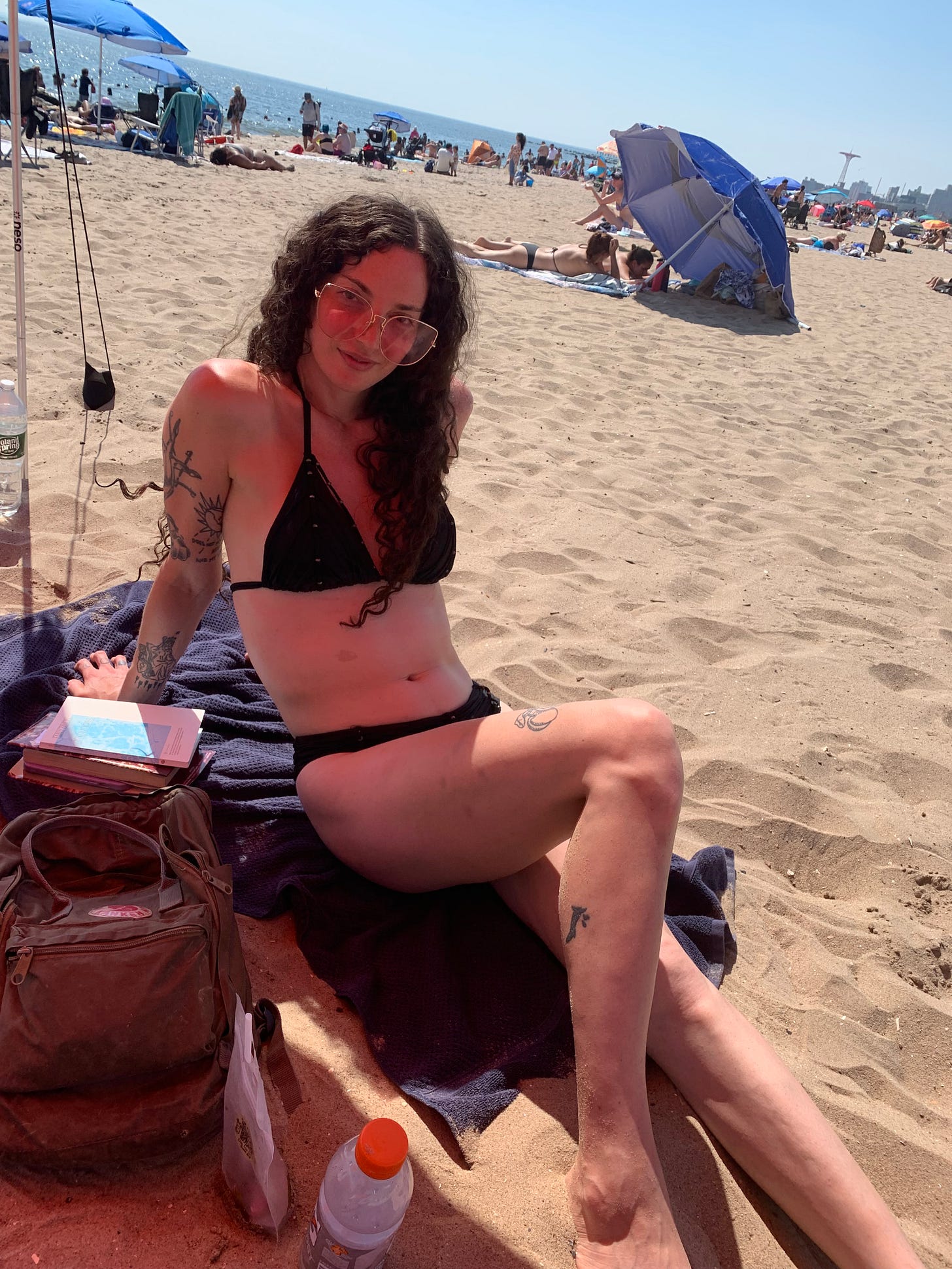XII. On Solitude
; or, My Summer of Dissolution
Nine months into the year recorded by May Sarton’s Journal of a Solitude, a stranger mails her the American psychologist Clark E. Moustakas’ 1961 study of loneliness, Loneliness. By her recollection, Sarton randomly opens its pages to this:
I began to see that loneliness is neither good nor bad, but a point of intense and timeless awareness of the Self, a beginning which initiates totally new sensitivities and awarenesses, and which results in bringing a person deeply in touch with his own existence and in touch with others in a fundamental sense.
It’s 1971. Sarton is nearly sixty and living alone in a restored rural New Hampshire farmhouse. There are the neighbors, sure, and the occasional visitor, as well as Sarton’s parrot, Punch, who seems always to be cold in his little gilded cage. Her cats are living elsewhere for the time being; later, Punch dies. The journal journeys between September and September, a period in which Sarton faced greater literary scrutiny following the publication of Plant Dreaming Deep (a book she decides gives a “false view” of her life, having occluded the “anguish” of solitariness and Sarton’s notorious “rages”). Her love affair with “X” has dissolved or is on pause—Sarton remains deliberately vague about the relationship; vague, too, on X’s identity, perhaps in part because Sarton loved other women. She often expressed anxiety over her potential exile to the ghetto of the “lesbian writer.”1
Solitude for Sarton is vocational: essential to the writing life. On several occasions, she suggests that marriage and motherhood are anathema to women’s artistry; these roles tug one’s attention in too many directions, divesting a woman from meaningful self-presence. The wife and mother cannot allow herself to become “an instrument for experiencing”; her vision is curtailed by domesticity, her way of seeing becomes effaced or overparticular in the devotional mode of being-for-others. A solitary existence, by contrast, is the path toward a more universal positioning of the subject: “The way in which one handles this absolute aloneness,” Sarton argues, “is the way in which one grows up, is the great psychic journey of everyman.”2
Recently I reviewed Rachel Cusk’s latest “novel” Parade for Bookforum’s summer issue. Cusk, too, seems to me distrustful of the correspondence (or rather clash) between familial orthodoxy and the (female) artist’s way; as one character in Parade considers, she must dissociate or step to the side of herself—become a kind of “stuntman”—in order to outrun the “consequences in one way or another of [her] biological femininity,” consequences that chain women to the material tedium of everyday time. Art requires a different temporal order; it demands a kind of elsewhere—a slant time—beyond what Cusk views as the piercing and inescapable present tense of domestic experience.
Private life gets tangled up in criticism, even if many of us won’t (publicly) cede this ground. I saw once I filed the review that I’d been tunneling through parallel fissures in the bedrock of my own life: I’d become troubled by the tension between my art and my love, troubled by how my intuitive inclination toward nurturing and domesticity had begun to blot out my artistic freedom. Quite suddenly I was overwhelmed by a sense that my work was gasping for air within the confines of my romantic life. In short: my book and my boyfriend seemed to be at existential odds. In June, I finished the first of these and left the second, fleeing, too, my certainty that I would be my boyfriend’s wife. I guess mine is a tired narrative, archetypal, and kin to a number of other straight women’s accounts of artistic silence/ing in recent years.3 To what extent we are responsible for our suffocation is the larger question, really; what must be interrogated are the limits of female agency within the heterosexual contract.
In the immediate aftermath of my decision, though, matters appeared clear—violent lines, yes, are usually drawn in the moment of a relationship’s dissolution. For four weeks he and I were forced to go on living together, sleeping beside each other, disassembling and re-litigating every shared memory of our previous four years. That month is among the most difficult of my life: each day, every hour, all the minutes struggled up through a quite tangible muck of grief. It was a kind of death. It didn’t help that, at the same time, an ongoing medical concern of mine had crossed into crisis territory, at which point I spent a disorienting and traumatic day at the E.R. Then three months unfurled—each week I lost hours of time navigating the deep rot of the American healthcare system. Thankfully the crisis has been resolved.
Meanwhile I watched every happiness I shared with the man I thought I’d marry curdle. Houses house emotion as they do bodies; I believe this implicitly. The atmosphere in our apartment grew thick with the bile of our breakup. My dog curled into herself. When uninterrupted by bouts of fury, silence fell over everything like a shroud. It often felt as if I couldn’t properly breathe. I would ride into the night on my bike, begging my chest to open, waiting for my lungs to expand, but there was nothing doing. The body at times refuses. I cried for hours every single one of those days. After two weeks it seemed improbable—ridiculous, really—that any tears might be left inside me, but I found in myself an endless well.
I had never before lived with a boyfriend, I had no idea how two lives could be gathered into such a strange, singular grammar. Ours was the longest and deepest relationship I’d been in. What’s worse, in its way, was that my decision to leave didn’t come from a place of hatred or fear. Other men were easy to witness as villains. I left them or they left me, but in the end, severance was simple. When a man you’re dating says all you’re good for is a blowjob, it’s fairly obvious who of the two of you has been wronged. When a man puts his hands on you, it might be difficult to get out but at least you know what the plan of action should be. Here, now, I had to reckon with ambivalence, complication, the escalating messes of history. Though we’d both failed our relationship (on this, at last, we agreed), it was I who’d snipped the umbilicus; I who shouldered that guilt; I the bitch, the cold one—I, the careerist.
When at the end of that terrible month K moved out, I saw clearly how enmeshed our lives had become. I found myself utterly unmoored by the unreality of this splitting into two. But of course our worlds had gone all muddled—how could I be so stupid as to imagine otherwise?
Before him I was always basically alone. Boyfriends drifted in and out of my life like smoke. I’d be heartbroken because some of these men diligently endeavored to break me, but also because I was often infatuated with my own heartbreak. None of the men were consequential; none of them ever loved me. I don’t say this to be mawkish. I was cut off from the world for decades. I’d reduced these men to fantasy, also—a fantasy of security; a fantasy of having my worth as a woman legitimated. Being alone, then, became a practice I was vibrantly good at. Isolation was my defensive crouch; solitude kept any wound from cutting too deep.
When I first read Sarton’s Journal twelve years ago, I was smug concerning the fact of my loneliness. I thought myself above it all, that spongy relational fray. I was invulnerable. I supposed I was carving a better formed, more dexterous artist from the marble of my suffering. Naturally I eschewed the actually shattering thing: real love. Not just the romantic kind, but friendship, too—deep friendship—being with others, really revolutionary openness. I was so banged up by life that any porousness looked to me like a threat. Any care extended was just a signal flare, doomed to burn rapidly out, to sink ineluctably beneath the waves. Care offered was only care that would soon be withdrawn; it represented nothing more nor less than its future absence.
At moments lately I am frightened. I think: what if it’s gone away? What if no one ever falls in love with me again? I feel so much older now. What if the days and the years stretch past me and I never again surrender to that spark? Men come calling, of course, as men are wont to do—they can sniff a recently-single woman out across the Atlantic ocean. But now I’ve known love. Perhaps this was the more unnerving possibility in those desolate years. Love “burns up the clutter” of life, writes Sarton, all its dull dailiness, but what to do with that accumulating heap of ordinary time when love is no longer in the room? I’m relearning solitude, or something like—learning how to be alone with myself once more for the long hours. I establish my body in the empty bed, I labor at rest shorn of the reassuring imprint of a man between the sheets beside me.
Before K I was an insomniac. Always I was wracked by nightmares. So far I’ve mostly managed to sleep through the night; perhaps our being together rewired something. People keep asking what I “learned” from the relationship and the question’s nearly as bad as the grief; I tell them I’d rather die than imagine those I love as extractable resources, I say my years with K were a blessing. With this little distance I try to carry our time with gratitude. We couldn’t make it work and I feel so lucky to have been loved by him—both of these things hold true.
Each morning Olive and I wake early—6:00AM, 6:30, or else 8:00 if I’ve bartended the night before. We set out for two or three miles; I chatter at her; I smile now at strangers; together, she and I count the birds. We see the old man with his enormous old dog in the park, and the dog is lately dying of cancer. Olive is nervous around this dog. “She’s scared he’s gonna rape her,” the old man says, and I suppose he’s probably right. The enormous dog, surprising no one, has enormous balls. They frighten even me! The old man tells me his family is moving him upstate to be closer to them. He sounds devastated when he talks about leaving the city and I don’t know how to console him. You’ll be missed, I tell him, and it’s true—everyone at the park loves him; everyone seems to know him.
Though the starlings mostly vanished in June, now they are back with their young in tow. I’ve been feeling it again. That baby fever, though for a long while it went away. I think it’s that I’ve been rewatching Sex and the City and I’m a Charlotte if I’m any of them. Tougher, maybe, but indescribably soft, a true romantic. Every time she plays a scene about wanting to become a mom I burst into tears. Of course I know now I won’t be a mother. The ache breaks above the surface still sometimes—I observe it, I let myself feel it. I am relieved my grief doesn’t have to annihilate me anymore. I live beside it, I live with it.
Some days are better than others. There are more of the good ones now. There is excitement, too, in embarking on a new path. I am full of desire. The mourning doves are more skittish this year, I don’t know why. At home Olive and I make breakfast together and I feed her fruit from my spoon, I do yoga, I FaceTime my little sister oftener. Her son is nine months now; he smiles at me through the phone. I am reading more and trying to be on social media less, though I often fail miserably at this.
At last, this week, I am able again to write.
I am going to catch up on my Proust. I swear it.
The other day a man kissed me as the sun broke through the clouds into his loft and I felt my whole self sharpen to a single, dazzling point. Once I saw desire as a curse, but now I know it for what it is—a gift, a breath of life, a window. I crashed my bike on the way home from his apartment; my shoe got caught in the pedal and I lost control. Rather than fly into traffic at a busy intersection I tipped myself over, landing first on my head—I wear a helmet, thank god—and then skidding on my left side a few yards: shoulder, knee, ankle. I’m splattered with painful abrasions, but lucky. When I heaved my bike upstairs and into the apartment I nearly called my ex, but didn’t. My pain is no longer his job, if it ever was. I felt deep sadness because I don’t know the next time I’ll be able to cry in front of a man. Maybe that’s not the worst thing. T came over, bringing food and painkillers. We watched a movie, some genre thing, and it was better than I expected.
I went to bed alone. I woke alone. I was OK. I opened Sarton’s Journal to a random page, too, and found this:
Keep busy with survival. Imitate the trees. Learn to lose in order to recover, and remember that nothing stays the same for long, not even pain, psychic pain. Sit it out. Let it all pass. Let it go.
I’m getting there.
Though, as she notes, Sarton does write “a novel about a woman homosexual who is not a sex maniac, a drunkard, a drug-taker, or in any way repulsive” in Mrs. Stevens Hears the Mermaids Singing (90-91).
Here I hear an echoing (of course) with Woolf’s treatise on the “androgynous” intellect in her Room—particularly as Woolf makes a couple cameos in Sarton’s Journal. In her youth, Sarton had been to the Woolfs for tea on a number of occasions; Sarton writes beautifully of Woolf’s capacious curiosity, her deep kindness that nonetheless held no warmth in it.
NOT to say my ex consciously suppressed my work, but that I think many of us fall into these erotic patterns of living, that conventional divisions of domestic labor and reproductive care are—perhaps!—not particularly compatible with the writing life, in any case for women.





WOW. This was such a moving piece. Thank you for writing & sharing these reflections. Each sentence brought me on a new journey!